|
|
Report:
 Important CONFERENCE in Copenhagen on FREEDOM of speech Important CONFERENCE in Copenhagen on FREEDOM of speech
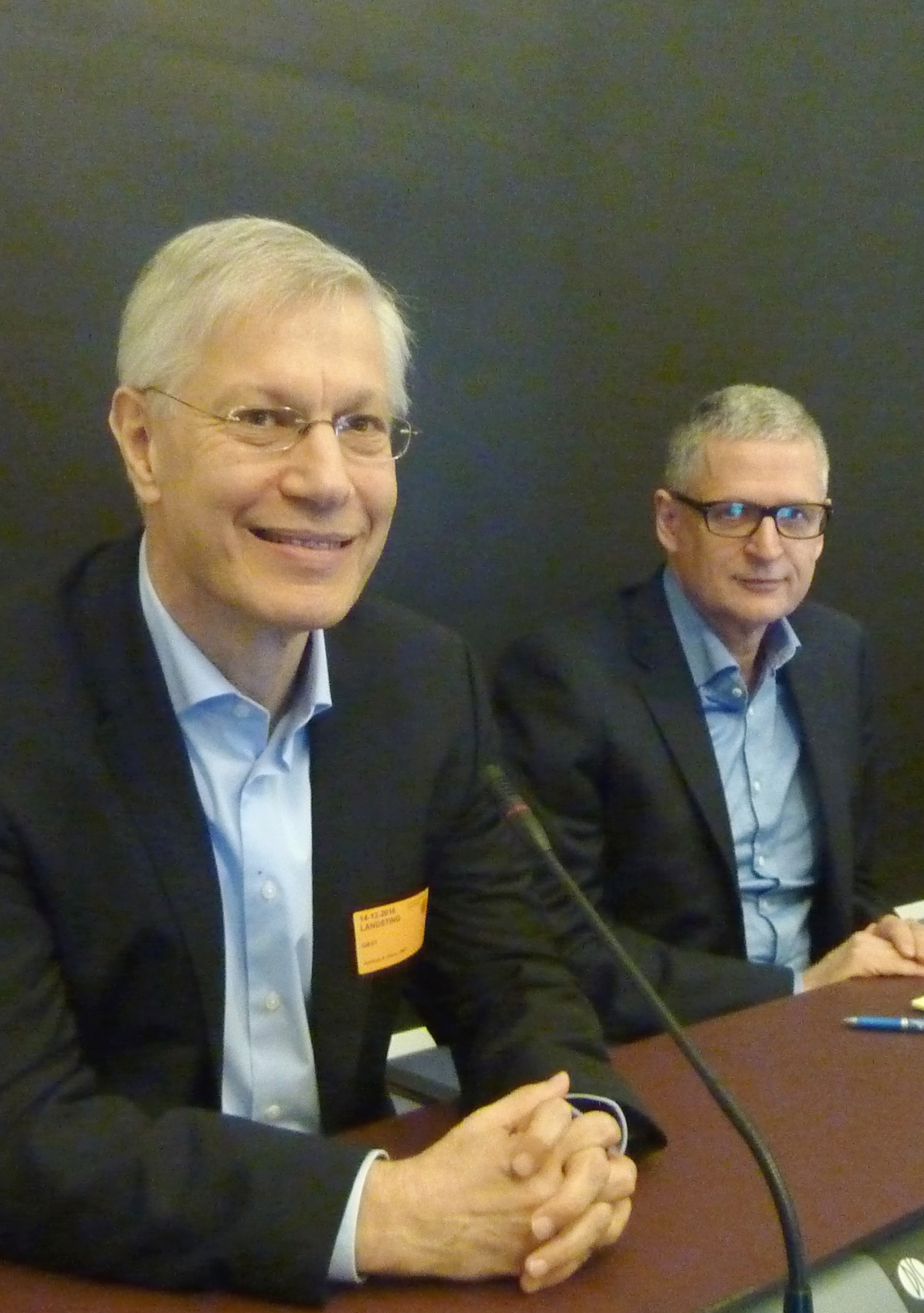
 By
By
Flemming André Philip Ravn,
editor, tripple M.A. (MPhil)
Published on December 14, 2016.
 © COPYRIGHT: All rights reserved, worldwide.
© COPYRIGHT: All rights reserved, worldwide.
POLITICAL SCIENCE/CONTEMPORARY HISTORY:
Two leading Western intellectual capacities met tonight in Copenhagen, namely
Yaron Brook (Executive Director of the Ayn Rand Institute) and Flemming Rose (journalist, author and former editor of Jyllands-Posten). The
two gentlemen
offered their views on this highly topical issue:
Is freedom of expression under attack, and how can one best fight against this destructive trend?
The conference (entitled "Free speech and the battle for Western culture") was
organised by the Danish branch of the Ayn Rand Institute and was hosted
by the Danish Parliament at Christiansborg Castle.
Flemming André Philip Ravn, the editor of this webzine, Tidsskriftet Epsilon,
and 250 others, including students from Solrød Gymnasium, attended the English-language conference
(which is why this article is written in English).
Yaron Brook is a much sought-after speaker and the
Executive Director of the freedom-oriented Ayn Rand Institute. He opened tonight's conference
in the heavily guarded Parliament building in Copenhagen
by saying that currently the greatest threat to free speech does not come
from totalitarianist or authoritarian ideologies per se, but from a current trend in
Western countries in the form of a new level of
political correctness.
In American academia, researchers and lecturers may find themselves
afraid of being yelled down at campuses or exposing their students to new ideas, because
nowadays students have a right not to be "triggered", not to be offended,
which means that they cannot endure
being exposed to ideas and opinions that evoke negative emotions in them.
According to Mr. Brook, this trend has also spread to the UK. For example, law students
at Oxford University have the right not to take classes in criminal law, if the theme of
rape should in any way upset them.
Thus certain university lectures have nowadays become odious; e.g. lectures
on thought-provoking and controversial issues are sometimes deemed
expressions of so-called "microaggression".
Microaggression is a term coined by psychiatrist and Harvard University professor
Chester M. Pierce in 1970 to describe insults and dismissals he regularly witnessed non-black Americans inflict on African Americans.
Eventually, the term came to encompass the casual degradation of any socially marginalized group, such as the poor and the disabled.
According to Hannah Yi and Wikipedia, it has also been defined as "rooted in racism, sexism -
or discrimination based on nationality or sexual orientation.
It can be delivered casually or even unconsciously".
Now, Mr. Brook asks: Can we go through life without being sometimes offended?
The trend in Western democracies is to ban offence.
No one is allowed to be offended anymore. Laws against hate speech are
implemented many places.
But this trend is bad and destructive.
We need to be sometimes provoked, to be sometimes offended, Yaron Brook believes.
Anything new in history is always offensive to someone, e.g. when Gallileo
proposed that the earth is not flat; when Newton came forward with his laws of physics;
or even today, Uber. New things always offend the status quo - and they should.
Development exactly means challenging the status quo of things.
Mr. Brook then goes on to philosophise about what has made the West the West. He
places an emphasis on the Enlightenment whose great endeavour was to research and
appreciate the efficacy of human reason. One cannot necessarily find answers in the commands
and dogmas of 2,000 years old books - yet only by using one's own mind and reason.
He sees a link to the ancient Greek philosophers, whose contributions to Western civilisation
were highly inspirational to the philosophers of the Enlightenment.
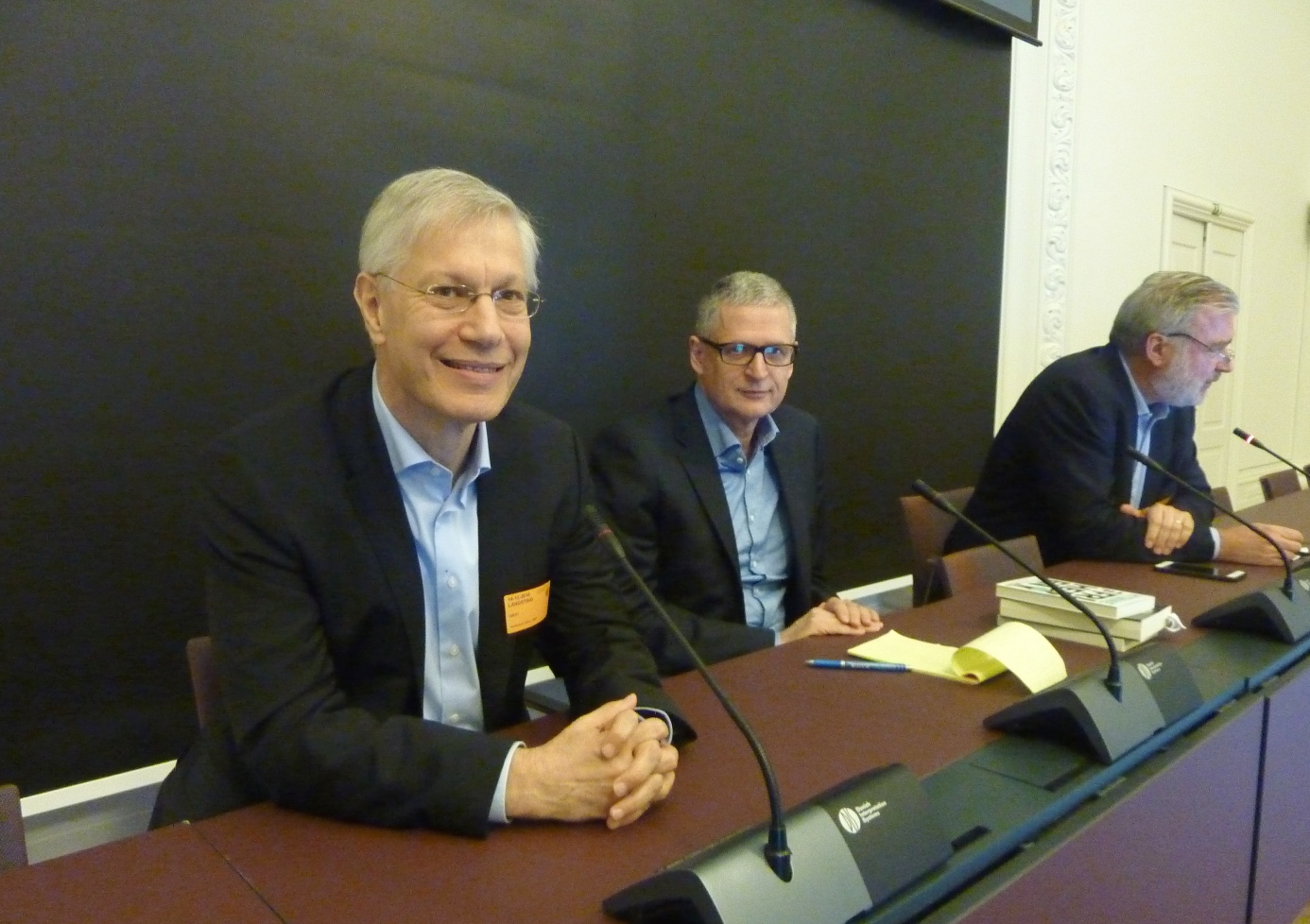
Mr. Yaron Brook to the left, and Flemming Rose in the middle.




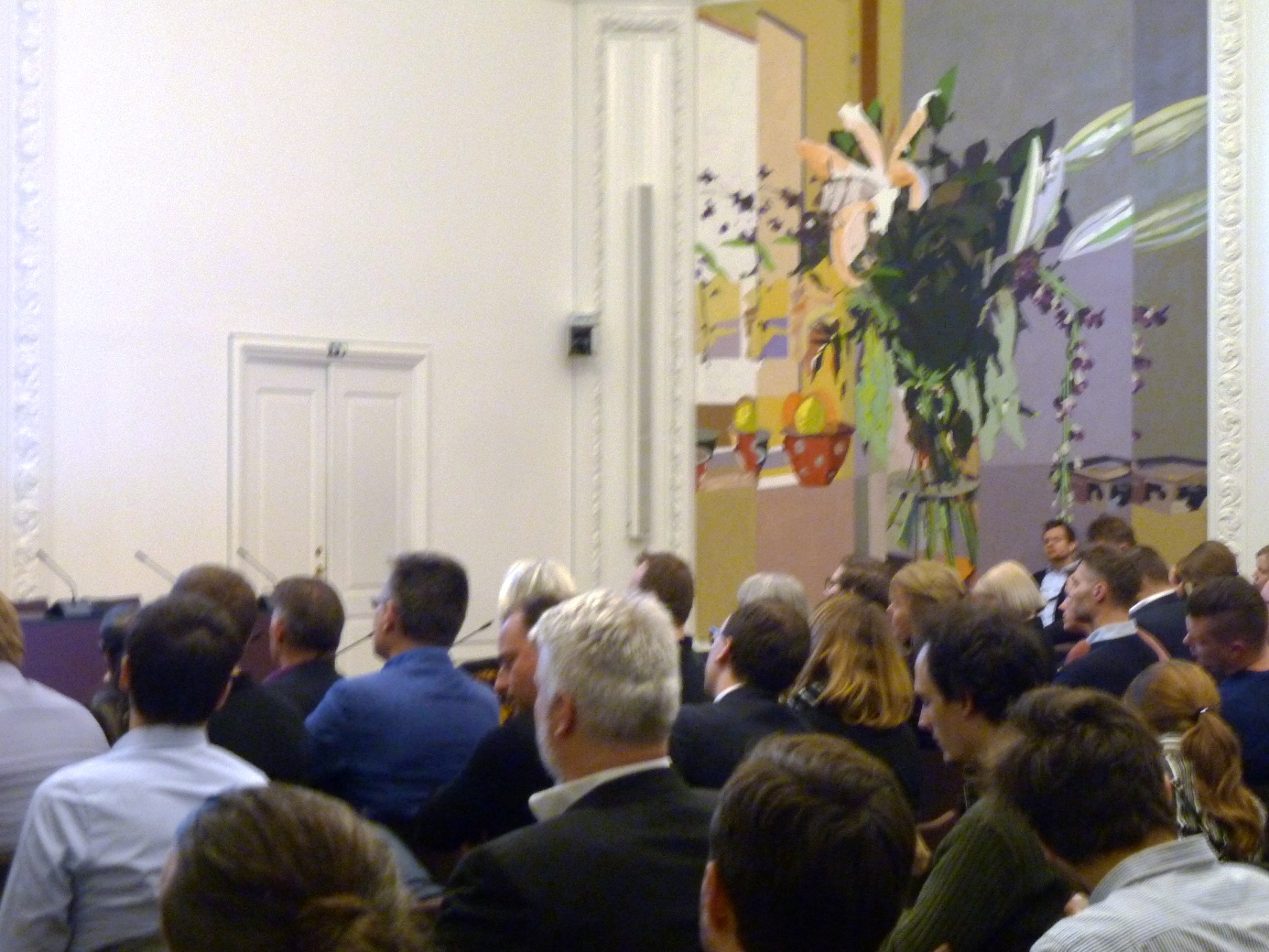
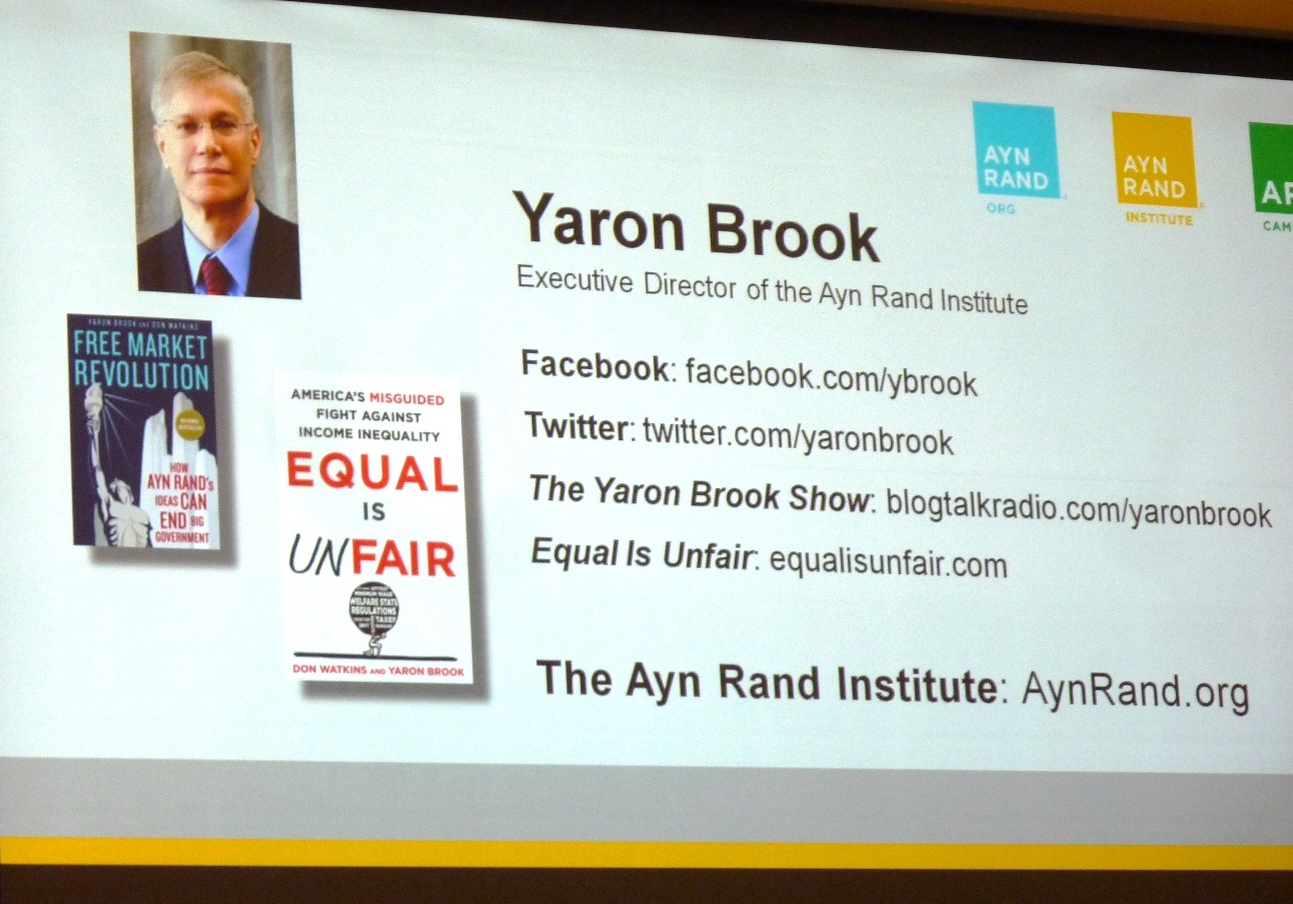
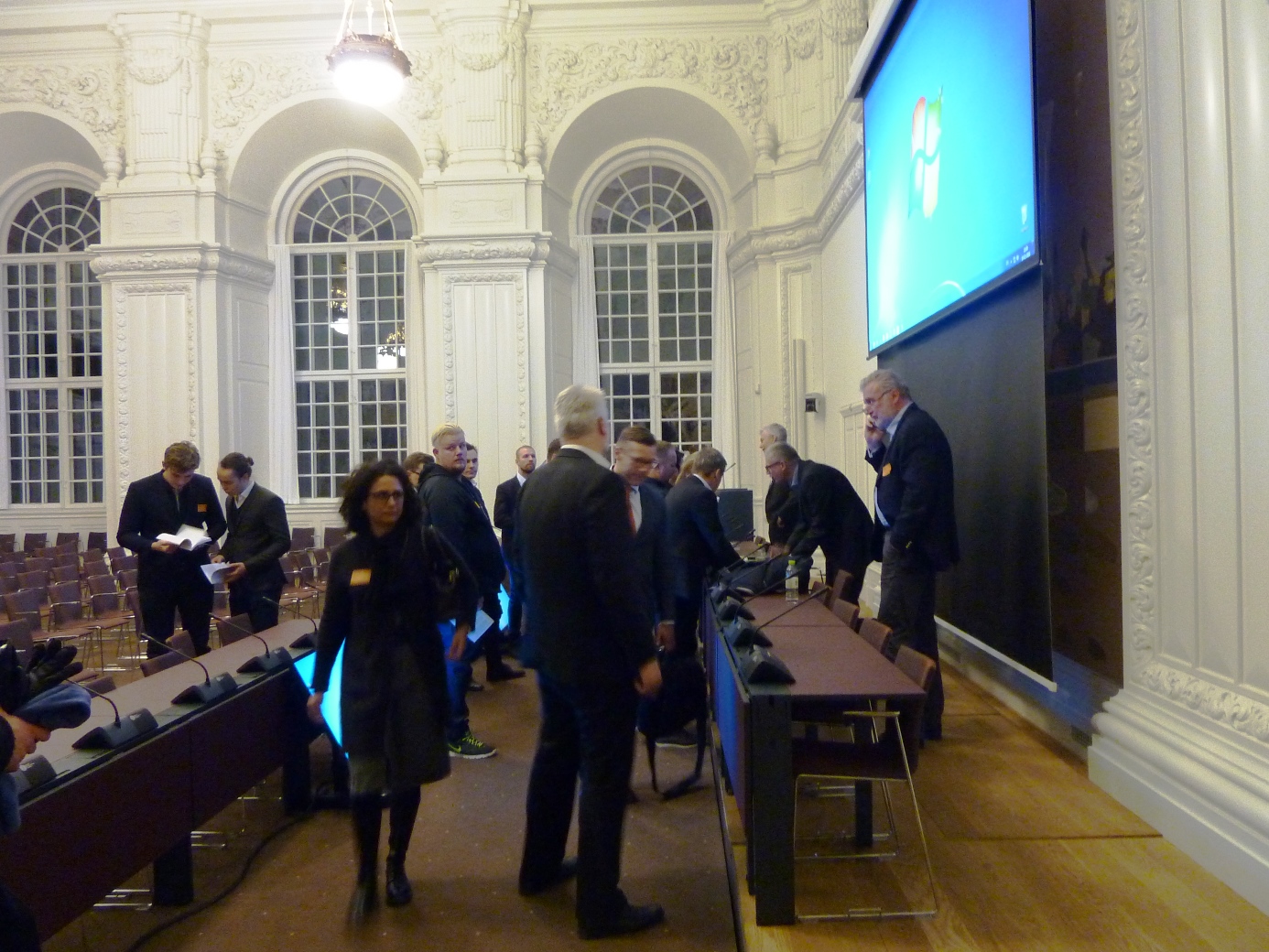
EMOTIONS VERSUS REASON
Yaron Brook points out that modern-day people should not be guided by their emotions,
but by their reason and their capability of reasoning.
Civilisation and freedom are inalienable values
that should not be lost.
Flemming Rose continues the conference with contrasting
tolerance with totalitarianism and makes this a core issue
in the battle for the European civilisation, which is fundamentally
challenged by new ideas of
microaggression and attacks on freedom of speech.
Diversity has many advantages, but it also has some
challenges when mixing many ethnicities and cultures, for
whose rules should apply when defining what people can or cannot say Mr. Rose
asks.
Not least today's digital technology proves to be a challenge
for free speech and pluralistic opinion-formation.
The tendency of echo chambers in social media is appalling and extremely counterproductive, for
algorithms and other factors try to shut out certain kinds of speech, certain perspectives,
certain approaches of thought so that people only get more of what they already like.
They are not challenged with ideas and thoughts that say something different.
Therefore, altogether, algorithms can turn out to be quite an anti-pluralistic and undesirable
function of today's social-media scene.
It has to do with values. If one's values are never challenged, and if one cannot utter
opinions that go against public consensus, something is wrong.
It undermines pluralism, Mr. Rose finds.
Mr. Rose works for the American Cato Institute whose purpose is to
promote an American public policy based on individual liberty, limited government, free markets and peaceful international relations.
He rightly believes in free thought and finds that an individual's
sense of morality should be based upon reasoning, not emotions or emotion-deduced
religious and/or moral convictions.
Or to put it briefly: Society should be ruled by argument, not by dogma.
Therefore, according to the two gentlemen, people need to speak up every time free speech is threatened;
otherwise it may ominously lead to censorship and, consequently, totalitarianism.
In contrast, free enquiry, the right to privacy, the right to transparent government and the right to free speech as well as the tolerance of dissent - for the press, for politicians, for private
individuals -
should and must be upheld.
They are inalienable rights of every individual in today's Western civilisation.
Yet doesn't a tolerant society risk self-destructing when no legal boundaries are set up for intolerance?
Actually, intolerance should not be met by censorship, however by counterarguments, the two gentlemen reasonate.
Altogether Mr. Brook's and Mr. Rose's ideas are meant to
reinforce the Western democracies - and thereby uphold Western civilisation as such.
Thanks to Luna Houmøller for proofreading this article.

|
|
|
|